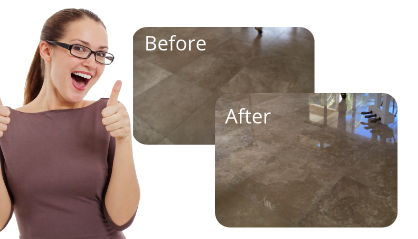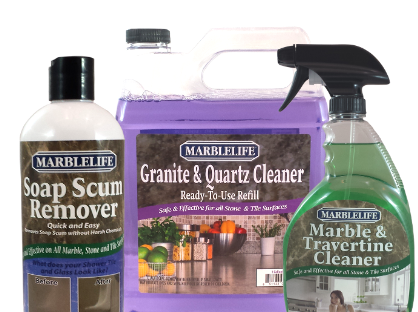What is an Etch?
An etch is the resulting damage to a surface from its exposure to acid. Many surfaces can be etched such as metal, glass and natural stone. Webster’s dictionary defines an etch as a pattern produced on a hard surface by acid or a laser beam. For the most part we will be referring to an etch, as being made in natural stone by an acid.
Etching Granite
Some acids can etch granite such as in ammonia, the common ingredient in popular window cleaners. Etches in granite will commonly display as a general dull appearance unless it is a spill resulting in a defined mark. Etches in granite are best dealt with by a professional as polishing granite by an untrained person can often result in damaging either the granite, the person or both. The best way to avoid etching granite is to keep anything acidic away from the surface. See the partial list of acidic items below.
Etching Marble
Most Marble is largely made of calcite or more commonly known as calcium carbonate, the main ingredient in an antacid like Tums. Calcium carbonate is a base, meaning it’s the opposite of an acid on the Ph scale. When acids and bases meet, they seek to neutralize the other. That is why when we have an acidy stomach, we use an antacid to neutralize the excessive stomach acid.
Likewise, when an acidic product like vinegar, which contains acetic acid, comes in contact with marble, the acetic acid in the vinegar and the calcium in the marble, seek to neutralize each other. The result is the acid eating the calcium out of the marble. This is a permanent damage in that there is no way to put the missing calcium back into the marble. The resulting whitish and perhaps dull looking mark is an etch.
Etches can vary from minor, where the etch mark is light and at time unnoticeable to more severe, where the acid has created an actual pit in the marble. In both cases the dullness can be polished out leaving the light etch seemly gone and the deep etch a shinny pit.
Sealing marble with a top quality sealer is a good way to lessen the likelihood of staining your marble, but will NOT provide any help in protecting against etches.
Preventing Etches
The best way to prevent etches is to keep the list of items below and similar items away from your natural stone. The use of cutting boards, place mats and coasters can help on countertops. Use trays or bins for health & beauty care products in the vanity areas and step back from the vanity area when applying perfume, deodorant and the like. On floors the use of rugs, mats and runners can be quite helpful. And of course be very mindful of the cleaning products and solutions used to clean your natural stone.
If you have a housekeeper or someone other than yourself who cleans your natural stone, we recommend that you have them become a Marblelife Certified Housekeeper. This is a free service from Marblelife for our customers and is only a 45 minute online video course. It can make the difference between a safe, clean and healthy home and a damaged one.
Repairing Etches
When granite is etched, it is best to have a professionally trained technician restore your granite. The process to polish granite can often result in damaging the granite, yourself or both.
Light etches and scratches in marble and travertine can be polished out with the use of Marblelife Marble Polish. With light etches, the whitish dull appearance can be polished out resulting in the etch apparently being gone. With deep etches where there is a noticeable pit, the whitish dull part can be polished out, however the result with be a shinny and less noticeable pit.
To completely remove the pit from a deep etch requires a professional who will grind the surface down to the level of the pit to make the pit unnoticeable. For more on this process, contact your Local Marblelife Service Professional.
Acidic items:
- Soda Pop
- Coffee
- Wine
- Vinegar
- Alcoholic Drinks
- Pickled Foods
- Many Sauces like Ketchup, Mustard & Bar-b-Que
- Citrus Fruits
- Tomatoes
- Mananas
- Some Tap Water
- Glass Cleaners
- Perfume & Makeup
- Air Fresheners
- Disinfectants
- Many Common Household Cleaners
- Rain can be acidic from pollution
- Urine, Vomit & Saliva (sorry)



